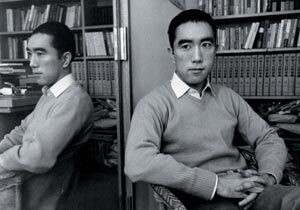
TOKYO – Six letters penned by literary giant Yukio Mishima to writer and politician Shintaro Ishihara have recently surfaced, offering new insights into their complex relationship and Ishihara’s eventual entry into the political arena. One letter, in particular, proved pivotal in Ishihara’s decision to pursue a career in politics.
The correspondence, discovered among Ishihara’s belongings after his death in 2022, includes a “get well soon” letter written by Mishima in 1967 while Ishihara was recovering from an illness. In this letter, Mishima expresses his anxieties about the state of Japan and implores Ishihara, then a young writer, to use his convalescence as an opportunity for reflection. "Recently, I’m often worried about the current situation and the future of Japan," Mishima wrote. "I’m sorry that you got sick just when I wanted to grab you and discuss the country and its politics with you.” He advised Ishihara to “see your illness as an opportunity to become a silent observer and coolly watch many things happening in this hectic society for a while.”
This advice resonated deeply with Ishihara. He later recounted in a 1998 book how the letter prompted a period of introspection during his recovery. This period of contemplation, free from the pressures of writing, ultimately led him to the decision to run for the House of Councillors.
While the two men enjoyed a close relationship, their views began to diverge over time. In 1970, just months before Mishima’s suicide, he publicly criticized Ishihara for his criticisms of the Liberal Democratic Party. Ishihara responded in kind, publicly disagreeing with Mishima’s assertions.
Takashi Inoue, a professor of modern Japanese literature at Shirayuri University and a Mishima scholar, commented on the significance of the letters. He noted that both writers shared a common approach to their craft, viewing the times and society as their adversaries. Despite their later political disagreements, Inoue suggested that their clash was inevitable, like “the phenomenon in which the same magnetic poles repel each other when they are close.” He emphasized the importance of the letters in understanding the dynamic between the two writers.
The discovered letters include other noteworthy content. In a 1965 letter, Mishima praises Ishihara’s novel “Stars and Helm,” commending its poetic descriptions of the sea and calling it a refreshing example of “sea literature.” In another letter from 1967, Mishima expresses high hopes for Ishihara’s future in the literary world, calling him “the only hope” in a world of “cowards.” He also sought Ishihara’s opinion on including his short story “Ambush” in an English-language anthology.
As the 1970s approached, their differences, particularly regarding the emperor system, became more pronounced. Ishihara later revealed in an interview that a 1969 meeting with Mishima, who brought a real sword, nearly turned violent.
Despite their disagreements, Ishihara maintained a deep respect for Mishima. In 1991, he published a book titled “The Eclipse of Yukio Mishima” and meticulously annotated Mishima’s writings in his notebooks. According to Ishihara’s fourth son, Nobuhiro, Ishihara reread Mishima’s works until his death and often expressed gratitude to Mishima for recognizing his true potential as a writer. In a 2010 interview, Ishihara confessed that he found Japan duller after Mishima’s death and expressed a deep sense of loss.
The newly discovered letters will be included in the expanded edition of “The Eclipse of Yukio Mishima,” scheduled for publication later this month. These letters offer a valuable glimpse into the complex relationship between two of Japan’s most prominent literary figures and shed light on the forces that shaped Ishihara’s path to politics.
[Copyright (c) Global Economic Times. All Rights Reserved.]





























